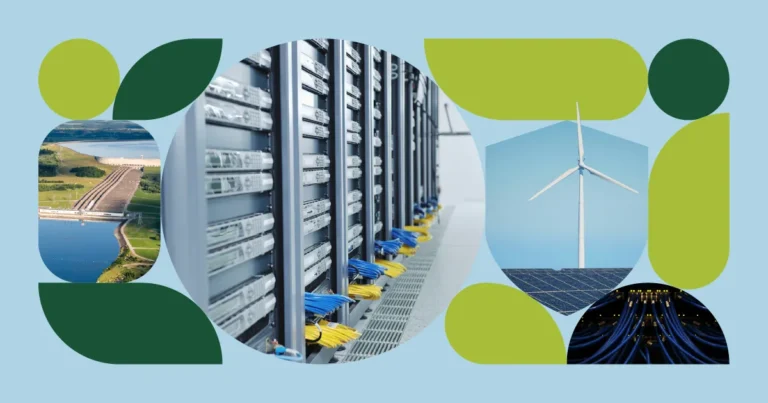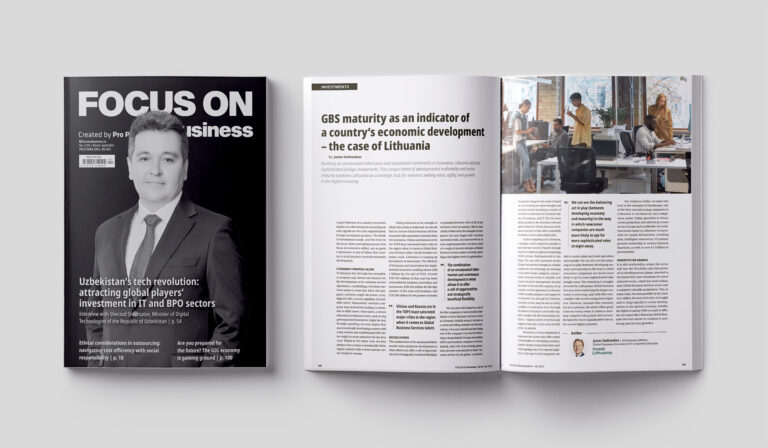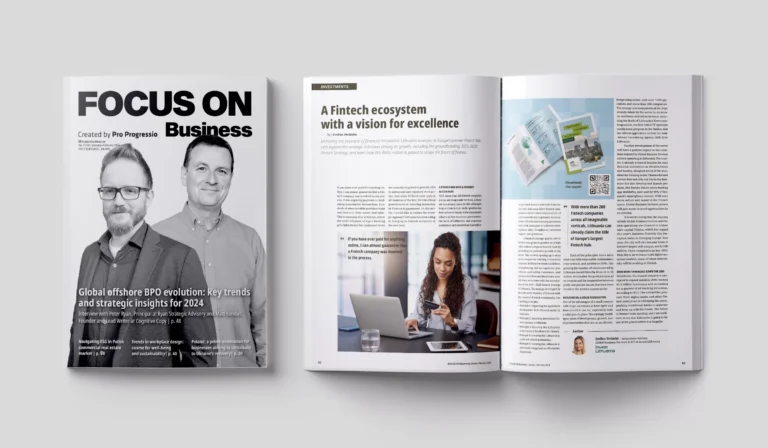FranceTV’s magazine program, ‘Avenue de L’Europe’, featured a report by journalist Herve Dhinaut on Lithuania’s rapidly developing business environment. The report, boldly titled ‘A powerful seduction act,’ follows Mr Dhinaut as he travels across Lithuania interviewing business leaders and uncovering how foreign direct investment is transforming the Baltic country.
You can watch the report by following this link.
And here is our translation of the transcript of the programme.
“Lithuania has a dynamic economy. We are an extremely ambitious nation and we are keen to move forward rapidly.” Justinas Pagirys, Business Development Director, Invest Lithuania.
When we contacted the Lithuanian authorities to discuss and explore what they considered to be their main asset in attracting foreign companies, we had a bit of a shock. They invited us to come to see a boat: ‘The Independence’.
The reason why it is named ‘The Independence’ is that this liquid gas terminal, docked in Klaipėda harbour on the Baltic Sea, allows Lithuania to autonomously manage its gas supply. For a year now, the country has been able to stockpile Norwegian gas, and hence no longer depends on its powerful neighbour, Russia, for its supply. This has reassured investors and offered them security.
Close to the port, tax-free zones have been created with the aim of attracting foreign businesses. These investors are certainly pampered; Eimantas Kiudulas, CEO of Klaipėda Free Economic Zone Management Company, literally pulls out the red carpet for them.
“So far we have welcomed 60 companies from 14 different countries, mostly from Northern Europe. We offer them infrastructure and they also benefit from subsidies offered by both the city and the state. These facilities are pretty attractive, but what really seals the deal are the various financial advantages, and the net profit foreign companies are able to secure. They quickly grasp just how attractive that profit margin is likely to become”, explained Mr Kiudulas.
[quote text=”Lithuania has a dynamic economy. We are an extremely ambitious nation and we are keen to move forward rapidly.” name_surname=”Justinas Pagirys” description=”Business Development Director, Invest Lithuania” left=””]
This very morning, he is finalising a deal with a contractor who wishes to open a new production plant for plastic pellets. The executive from the Indian company setting up the plant is clearly impressed by the warm welcome Lithuania is able to offer.
“For the first six years, we will benefit from tax-free status. After this, the rate will remain cut by half over the long term. What’s more, there is an abundance of qualified and experienced workers, young people fluent in English. The infrastructure is good, and the salaries are less than in the majority of European countries. It’s the combination of all these factors that is leading us to open a plant here very shortly” said Yogendra Kamal Malik, CEO of Indorama.
We head off to Kaunas, a city located in the heart of the country. We have a meeting at the head office of a company called DPD. This European-financed group has opened a logistics hub here less than a week ago. It’s all brand new and shiny. Tomas Valenta, the Technical Manager, is delighted to show off his gleaming sorting line.
“We have an overnight capacity to sort more than 15,000 parcels and have not even reached full volume yet. Within two months, we hope to be able to dispatch 20,000 to 25,000 units. Eventually, when all our sorting lines are up and running, our hourly handling capacity will be 7,000 parcels” said Mr Valenta.
The minimum salary in Lithuania is €300 per month, and this factor has played no small role in DPD’s decision to settle on this location for its logistics hub.
Our third pit stop is Vilnius, the capital city. We visit the offices of Invest Lithuania, the governmental agency responsible for the international branding of the country. The place is packed with tax experts, marketing gurus, and communication specialists. Everyone here has handfuls of degrees; they’re all young and good looking; and every single person within the team seems to be able to match the energy levels of the Justinas Pagirys, 30, the agency’s Business Development Director.
“Our economy is extremely competitive. Lithuania is not burdened by its small size; quite the contrary. We have room to manoeuvre here, and we can amend laws, adapt regulations, and create infrastructure on demand to address needs in a tailour-made fashion. We have remained outcome focused. We are a young country, and thanks to our reactiveness and receptiveness, we are able to respond instantly to the needs of foreign investors”, said Mr Pagirys.
This is the office where the marketing campaign to promote the country’s economy was formulated. Its main message is loud and clear: youth and talent abound.
Since cycling is clearly ‘in’, we have rented bikes to explore this Lithuania that vibrates with talent so visible it attracts foreign companies from far and wide.
A casual atmosphere; a cosy setting; we are at ’Wix’, a company that creates bespoke websites for private clients. Average employee age: 28. These brilliant students, who have all gone off and completed some of their hands-on training overseas before returning home, are worth their weight in gold and sought out desperately by companies.
“Of course, we recruit only the best: everyone is highly qualified. When we recruit though, the key factor is the candidates’ expertise in programming, and their ability to apply this specialist knowledge within new initiatives. Lithuanians outperform everyone in this”, explained Monika Laukaitė, WIX, CEO.
[quote text=”When we recruit though, the key factor is the candidates’ expertise in programming, and their ability to apply this specialist knowledge within new initiatives. Lithuanians outperform everyone in this.” name_surname=”Monika Laukaitė” description=”WIX, CEO” left=””]
Importantly, these highly qualified young employees receive salaries far lower than is the case in the rest of Europe.
“Yes, salaries are low. But the cost of living is also much lower here. In the end, it evens out. I don’t really see it as a problem”, Vilius Lukošius, Programer, said.
“The country is finding an identity, discovering its true self. It has grown remarkably fast. In Western Europe, everything is already in place and established. Having the feeling that you play a part in all this growth, it’s a really important experience as far as I am concerned. It’s fascinating, really”, Valdemaras Repšys, Programer, said.
Many young people here are clearly happy to be home and to remain in their country, but we also encountered long-term expats who had just returned to Lithuania. This was the case for Algirdas.
“In this company, we specialize in biopharmaceuticals. Within these labs, we carry out research on vaccines and handle clinical trials for pharmaceutical giants”, explained Mr Algirdas Žiogas, Scientific Director of a biotech company, said.
He was working in Switzerland and had a job as the head of a lab. He was highly paid, but when he realized to what extent large multinationals were settling in Lithuania, and what vast opportunities they had begun offering, he did not hesitate for an instant.
“There are more and more highly qualified experts returning home after numerous years living overseas as expats. I spent 18 years in Switzerland. I came home just under a year ago, and I have no regrets: many companies are hiring young people trained locally, but there is also a large demand for seasoned professionals with a high level of skills and expertise acquired abroad”, said Mr Žiogas, Scientific Director of a biotech company.
Lithuania has successfully attracted many Scandinavian, German and American companies… but where are the French investors? In Vilnius, the only taste of France we encountered was, at first, this restaurant with a distinct French flavour. Then came the bikes…which on closer inspection, appeared quite familiar.
The French ‘vélib’ concept has been renamed ‘orange bike’ here. The locals take exceedingly good care of these bikes.
The French consortium JC Decaux, which has brought in the bike share concept, is also the leader in the field of advertising space. The CEO of this group, Zenata Fomova – who joins us by bike, of course – says she fails to understand the reticence displayed by French companies.
“Every year, it has become easier and easier to invest and establish operations in Lithuania, since rapid steps have been taken to ease this process. The bureaucratic machine has become surprisingly flexible. A genuine dialogue now exists between private companies and local administrations. The number of European projects present within the country never ceases to rise”, said Mrs Fomova, CEO of JC Decaux Lithuania.
[quote text=”The bureaucratic machine has become surprisingly flexible. A genuine dialogue now exists between private companies and local administrations.” name_surname=”Zenata Fomova” description=”JC Decaux, CEO” left=””]
So why are French investors so conspicuously absent? We decided to put this question to the official spokesperson for France within the country: its Ambassador.
“Well, you know, there is history and geography. We are at opposite ends of Europe in this vast continent of 28 nations. Hmm, French Nationals often ask me ‘Where exactly is Lithuania?’ There is a certain degree of confusion. People often call it a Baltic State, but they are not quite sure where it is. It’s a sometimes shocking realization. There is a real gap between the image people have and the reality on the ground. You know, there is that whole sub-text: Eastern Europe, new Member States, low-cost countries, etc. I think this is, unfortunately, very central to people’s way of thinking. It borders on prejudice, and while these preconceived ideas keep us contented, they prevent us in reality from moving forward”, explained Mr Philippe Jeantaud, French Ambassador to Lithuania.
The very few French companies that have taken an interest in the country limit their activities to buying out local businesses. This is what the Vinci group specializes in. It’s CEO, Stanislavas Kablys, hops from construction site to construction site; in this country in full growth, there is no lack of road projects on the go. Lithuania has an endless number of initiatives and projects lined up for the taking. Vilnius is now thinking about an underground network. French companies need to wake up if they want to get a piece of the pie.
“It’s an emerging market. French companies need to establish a presence within its borders before too long, and demonstrate that they have the know-how required. They have already begun to fall behind. The market is not yet saturated, but German and Scandinavian companies are already well established here. They are a known entity and well respected”, said Mr Kablys, CEO of Eurovia-Vinci.
A small nation with vast ambitions, Lithuania is set on attracting – through carefully crafted ad campaigns – new companies, particularly those from western and southern Europe, a region for which a specific name has been coined in this country: Old Europe.













